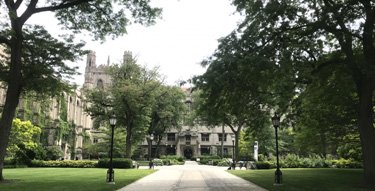Faculty Statement (July 2020):
The English department at the University of Chicago believes that Black Lives Matter, and that the lives of George Floyd, Breonna Taylor, Tony McDade, and Rayshard Brooks matter, as do thousands of others named and unnamed who have been subject to police violence. As literary scholars, we attend to the histories, atmospheres, and scenes of anti-Black racism and racial violence in the United States and across the world. We are committed to the struggle of Black and Indigenous people, and all racialized and dispossessed people, against inequality and brutality.
For the 2020-2021 graduate admissions cycle, the University of Chicago English Department is accepting only applicants interested in working in and with Black Studies. We understand Black Studies to be a capacious intellectual project that spans a variety of methodological approaches, fields, geographical areas, languages, and time periods. For more information on faculty and current graduate students in this area, please visit our Black Studies page.
The department is invested in the study of African American, African, and African diaspora literature and media, as well as in the histories of political struggle, collective action, and protest that Black, Indigenous and other racialized peoples have pursued, both here in the United States and in solidarity with international movements. Together with students, we attend both to literature’s capacity to normalize violence and derive pleasure from its aesthetic expression, and ways to use the representation of that violence to reorganize how we address making and breaking life. Our commitment is not just to ideas in the abstract, but also to activating histories of engaged art, debate, struggle, collective action, and counterrevolution as contexts for the emergence of ideas and narratives.
English as a discipline has a long history of providing aesthetic rationalizations for colonization, exploitation, extraction, and anti-Blackness. Our discipline is responsible for developing hierarchies of cultural production that have contributed directly to social and systemic determinations of whose lives matter and why. And while inroads have been made in terms of acknowledging the centrality of both individual literary works and collective histories of racialized and colonized people, there is still much to do as a discipline and as a department to build a more inclusive and equitable field for describing, studying, and teaching the relationship between aesthetics, representation, inequality, and power.
In light of this historical reality, we believe that undoing persistent, recalcitrant anti-Blackness in our discipline and in our institutions must be the collective responsibility of all faculty, here and elsewhere. In support of this aim, we have been expanding our range of research and teaching through recent hiring, mentorship, and admissions initiatives that have enriched our department with a number of Black scholars and scholars of color who are innovating in the study of the global contours of anti-Blackness and in the equally global project of Black freedom. Our collective enrichment is also a collective debt; this department reaffirms the urgency of ensuring institutional and intellectual support for colleagues and students working in the Black studies tradition, alongside whom we continue to deepen our intellectual commitments to this tradition. As such, we believe all scholars have a responsibility to know the literatures of African American, African diasporic, and colonized peoples, regardless of area of specialization, as a core competence of the profession.
You could as easily accuse any university English Department of systematically being anti-Lithuanian, anti-French, anti-Japanese, or anti-Eskimo (excuse me! Inuit) for its shameful neglect of the artistic legacy of any, or all, of the above, and for its “aesthetic rationalizations” of the unequal representation of Lithuanians, Frenchmen, &c. in their universities’ student bodies, in high-paying elite positions in American investment banks and Wall Street Law Firms, and in Supreme Court Appointments.
Personally, I think sane people with a deep interest in English Literature are just as well off not studying under such a collection of lachrymose and deranged Marxists as apparently currently infest Chicago’s English Department.
That distant buzzing sound you hear is the late Allan Bloom, author of The Closing of the American Mind: How Higher Education Has Failed Democracy and Impoverished the Souls of Today’s Students, spinning in his grave at 78 rpm.






McChuck
The University if Chicago is second only to Colombia in its pozzed nature. The devils of the Frankfurt School settled on Chicago for their teacher’s education experiments.
Nori
Top Rated.
By whom,or what?
Asking for a friend.
Please Leave a Comment!